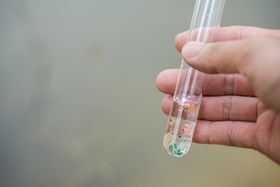Why Proper Hydration Is Crucial for a Healthy Liver
Dehydration forces your liver to work harder, concentrates toxins in your blood, and can worsen conditions like fatty liver disease. Proper hydration supports detoxification, bile production, and liver healing—but most people don't drink enough water to optimize liver function.
Published September 13, 2025

Fatigue that won't go away. Difficulty concentrating. A sluggish feeling that no amount of coffee can fix. Sound familiar? These aren't just signs you need more sleep; your liver might be crying out for water.
Every day, your liver works overtime processing toxins, producing bile, and keeping you healthy. But when you're even mildly dehydrated, your liver struggles. Blood gets thick like syrup, toxins pile up, and your hardworking liver cells start breaking down
The solution is proper hydration at a cellular level that can transform your liver health, boost its detox power, and even help reverse existing damage.
» Learn when to drink water for optimal hydration
Liver Problems Caused by Decreased Water Intake
Several liver-related health issues can be significantly worsened by chronic dehydration:
- Fatty Liver Disease: Dehydration makes it harder for your liver to break down fats properly, causing fat to build up in liver cells. This condition affects over 25% of adults worldwide and can lead to serious liver damage [1].
- Digestion Issues: Your liver helps process carbohydrates, fats, and proteins for energy and controls blood sugar. When you're dehydrated, your liver makes less bile, which affects how well you absorb fats.
- Worsening Existing Conditions: Dehydration can make conditions like fatty liver or hepatitis worse by reducing how well your liver can filter toxins.
- Hepatic Encephalopathy: Dehydration may worsen the decline in brain function that happens when your liver can't remove toxins from your blood.
- Cell Damage and Inflammation: Poor blood flow from dehydration can damage liver cells and cause inflammation.
With proper hydration, many of these issues can be prevented or significantly reduced.
Is Water Good for Your Liver as You Age?
Liver function typically changes with age, and staying hydrated becomes more important at different life stages. As we get older, our bodies have a harder time managing fluids and minerals effectively.
This change can lead to health problems, from muscle cramps and tiredness to confusion and even heart issues. The aging process affects how well your liver can filter toxins, making proper hydration more important for older adults.
» Learn about the best drinks for your liver wellness
Does Water Impact Liver Health
Understanding how water affects liver function means looking at lifestyle factors, testing challenges, and existing health conditions that affect both how much water you need and how well your liver works.
Liver Function with Different Lifestyles
Lifestyle factors like diet, alcohol use, and medications significantly affect how water supports liver function:
- Heavy drinking damages liver cells and increases fatty liver disease risk [2]. Proper hydration helps the liver process alcohol more effectively and reduces vulnerability to alcohol-related damage.
- Foods high in processed ingredients, fats, and sugars contribute to fatty liver disease. Adequate water intake is beneficial for digestion, helping the liver metabolize these challenging foods more efficiently. Regular exercise helps reduce liver fat.
- Certain drugs stress the liver more when combined with dehydration. Proper hydration helps the liver process medications more efficiently.
When Water Masks Early Liver Problems
Dehydration can make the early signs of liver dysfunction more difficult to diagnose:
- Both dehydration and liver dysfunction cause fatigue, weakness, and cognitive changes like confusion [3]. This overlap makes it challenging to pinpoint the underlying cause.
- Dehydration concentrates substances in the blood, including liver enzymes. This can artificially elevate test results, making the liver appear more impaired than it actually is.
- Dehydration-related symptoms and altered lab results could delay proper diagnosis of liver dysfunction, potentially leading to delayed treatment.
How Water Helps with Pre-existing Health Conditions
Pre-existing conditions like diabetes, high blood pressure, and obesity significantly impact both hydration needs and liver function:
- Diabetes: Elevated blood sugar levels cause excess glucose excretion through urine, leading to increased urination and thirst. Proper hydration supports the liver's glucose metabolism and reduces fatty liver disease risk.
- Obesity: Linked to metabolic syndrome, including insulin resistance and impaired glucose tolerance, obesity affects fluid regulation. Adequate hydration helps the liver process fats more effectively.
- High Blood Pressure: This can damage the kidneys, affecting fluid balance regulation. Since the kidneys and liver work together in waste removal, hydration supports both organs' cooperative function. Hydration levels can heavily influence your heart's blood pressure.
» Learn more about the connection between headaches and dehydration
How Water Helps Maintain Optimal Liver Health
Understanding the specific ways water supports liver function shows why proper hydration is essential for this vital organ's performance and longevity.
Water and Liver Detoxification
Drinking water directly supports the liver's ability to flush toxins and metabolic waste from the bloodstream [4].
Think of water as your liver's best cleaning crew. Every sip helps dissolve the junk your liver needs to get rid of—toxins from food, alcohol, even pollution you breathe. Without enough water, it's like trying to clean a dirty pan with no soap.
Water helps dissolve waste and toxins in your body, making it easier to get rid of them through urine and sweat. It also keeps your blood volume at the right level, which ensures good blood flow to your kidneys and liver, making waste removal work better.
Water is an important part of bile, which your liver makes to help break down and absorb fats from food. When you don't drink enough water, your liver can't work properly, causing toxins and waste to build up in your body.
Drinking enough water every day makes sure your liver can do its job well and effectively remove harmful things from your system.
Water and Fatty Liver Risk
Staying hydrated is directly connected to how your liver makes bile, which affects how well you digest fats and prevents fatty liver disease.
Bile is mostly made of water, minerals, and bile salts. Water helps bile flow smoothly—when you drink enough water, bile stays liquid and can easily move from your liver and gallbladder into your small intestine.
Electrolytes, like sodium and potassium, are important parts of bile and control how it flows. When you stay well-hydrated, bile flows properly, helping your body break down and absorb fats correctly, which stops fats from building up in your liver.
When your body can't digest fats well, extra fat can collect in your liver, causing fatty liver disease. Drinking enough water supports healthy bile flow, preventing this fat buildup.
Water and Liver Enzymes
Drinking enough water helps lower high liver enzymes by supporting the liver's ability to remove toxins and improve how well it works overall. The liver is responsible for cleaning out harmful substances from your body, including medications, alcohol, and waste products your body creates.
The liver is also important for breaking down sugars, fats, and proteins that you eat. It makes bile, which gets stored in your gallbladder and released into your small intestine when you need to digest food.
Your liver has amazing healing powers and can grow new cells to repair itself when damaged. It also helps your immune system by filtering out bacteria and foreign materials from your blood, keeping you healthy.
Water and Liver Damage
Some kinds of liver damage can be fixed, especially when caught and treated early. Your liver has an amazing ability to heal and rebuild itself—it's one of the few organs that can grow new healthy cells to replace damaged ones instead of forming scar tissue.
Staying hydrated is important for your overall health, and this includes your liver. Drinking enough water helps your liver get rid of toxins and work properly while also helping your body absorb nutrients better.
Expert Tip: Although water is a main part of nutrition to help the liver heal, keeping to a healthy diet will also help recovery faster. Always consult a professional about the health and well-being of your liver.
Water and Liver Inflammation
Drinking enough water is important for reducing harmful stress and inflammation in your liver.
When you don't drink enough water, it can increase damage to your liver cells and hurt how they make energy, while staying hydrated helps your cells work properly and protects them from harm.
Hydration can influence inflammatory responses in the liver, and being dehydrated can make inflammation worse.
Good hydration can lower inflammation by helping your liver's natural anti-inflammatory processes work better. Drinking enough water also supports how your liver removes toxins from your body, making the liver's job easier and less stressful.
» Discover how to balance your electrolytes while detoxing your body
Hidden Benefits of Liver Hydration
Beyond the primary detoxification benefits, hydration offers several lesser-known advantages for maintaining or improving liver health:
- Improved Blood Flow: Water makes your blood thinner, making it easier for your liver to filter and remove toxins, including alcohol and other harmful substances.
- Reduced Burden on Organs: By helping to prevent constipation and making it easier to remove waste through urine and sweat, staying hydrated reduces how hard your liver and kidneys have to work.
- Weight Management: Drinking water helps you feel full, which can help you eat fewer calories. Keeping a healthy weight is important for preventing fatty liver disease.
- Preventing Complications: Severe dehydration can hurt how your liver works and make certain liver problems worse. Drinking enough water helps prevent this.
- Supporting Body Functions: Water is needed for many body processes, including digestion and controlling body temperature, all of which indirectly help keep your liver healthy.
» Discover the best water types to drink for cellular hydration
Which Water Is Good for Liver Health
The quality or type of water you drink can make a difference in your liver health outcomes:
Different types of filtered water are important for staying clean, safe, and well hydrated, regardless of source and pH.
For liver health, alkaline water filters are not necessarily better than spring water, mineral water, or filtered water. While some people believe alkaline and electrolyte water has benefits, the scientific community remains divided.
Drinking water supports all the major functions of the liver's natural detox process by helping transport toxins to the kidneys for removal.
Expert Tip: Drinking water helps the liver filter out and eliminate waste from the liver and the overall body. Adequate water intake can enhance toxin removal, slowing down their build-up.
» Find out if mineral water is good for your liver
Start Supporting Your Liver Today
Your liver works constantly to keep you healthy, but it needs enough water to do its job well. Every glass of water you drink helps remove toxins, reduces inflammation, and helps prevent liver damage.
Start easy. Try to drink 8-10 glasses of clean water each day. Many people notice more energy, better digestion, and clearer thinking within a week of drinking water consistently.
Want to optimize your liver health further? Consider MAYU's essential minerals for mineral-rich water that supports cellular hydration and liver function, or the Swirl for structured water that can enhance your hydration's effectiveness.
Your liver has been protecting you—now it's time to protect it. Start with your next glass of water.
» Make your water more hydrating naturally using the Full Cycle System
References
BiologyInsights Team. (2025, August 7). Can Dehydration Cause Serious Liver Issues? - Biology Insights. Biology Insights. https://biologyinsights.com/can-dehydration-cause-serious-liver-issues/
Patel, R., & Mueller, M. (2023, July 13). Alcohol-Associated liver Disease. StatPearls - NCBI Bookshelf. https://www.ncbi.nlm.nih.gov/books/NBK546632/
Hepatic encephalopathy. (2025, August 19). Cleveland Clinic. https://my.clevelandclinic.org/health/diseases/21220-hepatic-encephalopathy
How Does Water Help Remove Harmful Toxins from Your Digestive Tract? (2024, August 21). APEC WATER. https://www.apecwater.com/blogs/water-health/water-remove-harmful-toxins-from-digestive-tract?srsltid=AfmBOorstq6hSLFoWZvLDZj7qcL1yoNa5W9pYeNk3xSy0qzgB1KOF5Rq
Disclaimer: The information published by MAYU Water is not a substitute for the expert knowledge, advice, and recommendations of trained professionals. We strongly recommend consulting with industry experts and primary or scientific sources before making any health, research-related, or other important decisions
FAQs
Can dehydration cause elevated liver enzymes?
Yes, dehydration can elevate liver enzymes by concentrating blood and reducing liver blood flow, causing cellular stress that releases more enzymes into the bloodstream.
How much water should I drink for optimal liver health?
Most adults should aim for 8-10 glasses (64-80 ounces) daily for liver support, though needs vary based on age, activity, climate, and health conditions.
Is warm or cold water better for liver health?
Temperature doesn't significantly impact liver benefits—consistent intake of clean water matters most. Choose whatever temperature encourages you to drink more.













































